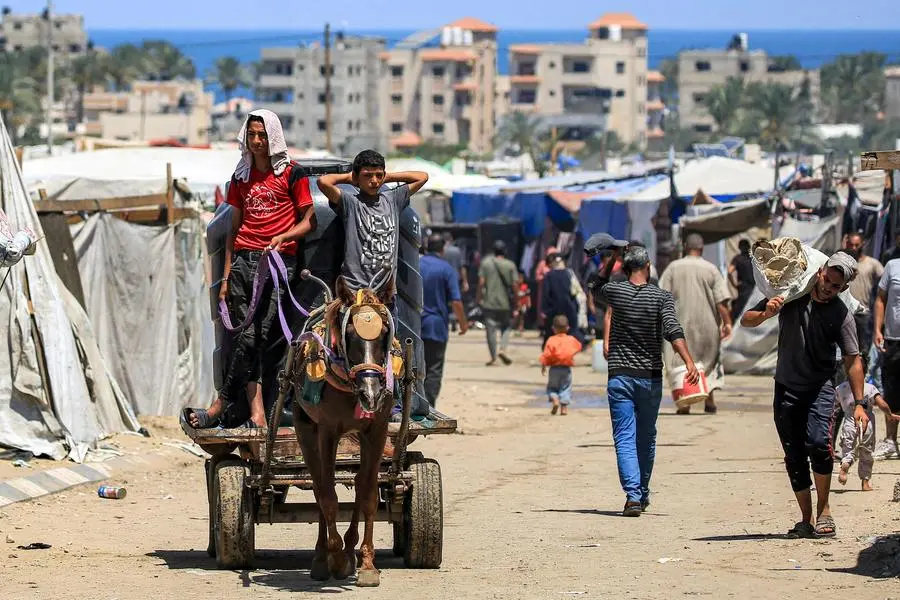PHOTO
Fighting raged Wednesday between Israeli troops and Palestinian militants in Gaza's southern city of Rafah, witnesses said, as fears grow of a wider regional war drawing in Lebanese Hamas ally Hezbollah.
Israel's bombardment of the Gaza Strip however appeared to ease days after Prime Minister Benjamin Netanyahu said the "intense phase" of the war was nearing its end, and as his defence minister visited Washington for crisis talks.
As the war in Gaza nears its 10th month, Israel's top ally the United States warned it of the risk of a major conflict against Iran-backed militant group Hezbollah in Lebanon following an escalation in cross-border fire.
"Another war between Israel and Hezbollah could easily become a regional war, with terrible consequences for the Middle East," US Defense Secretary Lloyd Austin told his visiting Israeli counterpart Yoav Gallant.
"Diplomacy is by far the best way to prevent more escalation," Austin said.
Top Israeli officials including Netanyahu have suggested they are open to a diplomatic resolution of the border tensions, though Gallant said Israel should be ready for "every possible scenario".
Israel's military said last week plans for an offensive in Lebanon were "approved and validated", prompting fresh threats from Hezbollah chief Hassan Nasrallah.
In Beirut on Tuesday, German Foreign Minister Annalena Baerbock warned that any "miscalculation" could trigger all-out war and urged "extreme restraint".
Turkish President Recep Tayyip Erdogan on Wednesday accused Western powers of backing Israel as it sets "its sights on Lebanon", seeking "to spread the war to the region".
On the ground in Rafah, on Gaza's border with Egypt, witnesses reported clashes during the night, and the Israeli military said its air force struck a rocket launch site.
Mohammad al-Mughayyir, an official with the civil defence agency in Hamas-run Gaza, told AFP that rescuers had recovered the bodies of "15 martyrs from various areas in Rafah city in the past few hours".
- Aid group 'outraged' -
The civil defence agency and hospital medics said at least four people, including three children, were killed in a strike early on Wednesday targeting a house in Beit Lahia, in the north.
Aside from that strike, agency spokesman Mahmud Basal told AFP, "there have been almost no attacks" and "the rest of the areas in the Gaza Strip are calm compared to yesterday".
An air raid on Tuesday killed Fadi al-Wadiya, an employee of medical charity Doctors Without Borders (MSF) who the Israeli military said was a "significant operative" for Islamic Jihad, a Palestinian militant group which has fought alongside Hamas.
MSF said on social media platform X that it was "outraged" by Wadiya's killing in a strike in Gaza City.
"The attack killed Fadi, along with five other people including three children while he was cycling to work near the MSF clinic where he was providing care," the charity said.
The military said the slain man had "developed and advanced the terrorist organisation's rocket array".
UN and humanitarian agencies have repeatedly warned that aid workers are not safe in Gaza, impeding their desperately needed efforts delivering aid for Gaza's 2.4 million people.
- 'Rolling operations' -
The bloodiest ever Gaza war started with Hamas's October 7 attack on southern Israel that resulted in the deaths of 1,195 people, mostly civilians, according to an AFP tally based on Israeli figures.
The militants also seized about 250 hostages, 116 of whom remain in Gaza although the army says 42 are dead.
Israel's retaliatory offensive has killed at least 37,718 people, also mostly civilians, Gaza's health ministry said.
The deaths include 10 members of Qatar-based Hamas political chief Ismail Haniyeh's family, including his sister, who Palestinian officials said were killed in a Tuesday strike.
UNRWA chief Philippe Lazzarini warned of the war's dire impact on children.
"We have every day 10 children who are losing one leg or two legs on average," Lazzarini told reporters.
"Ten per day, that means around 2,000 children after the more than 260 days of this brutal war."
Meanwhile the Integrated Food Security Phase Classification partnership said its March warning of imminent famine in north Gaza had not materialised, but around 495,000 people still face "catastrophic levels of acute food insecurity".
Netanyahu on Sunday said "the war in its intense phase is about to end in Rafah", which the Israeli military sees as Hamas's last stronghold, with some troops to be redeployed to the northern border with Lebanon.
Mairav Zonszein, an analyst for the International Crisis Group, said the military would likely "move to rolling operations" in Gaza and "always keep some troops on the ground" in strategic areas of the territory.





















